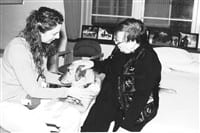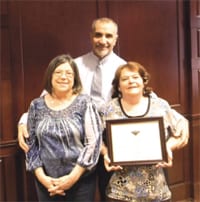New Breed of Specialist Animal-assisted Therapy Enhances Patient Progress At HealthSouth
Amanda brings out the best in Rose Crowley.
She motivates Rose to extend her right arm, use her right hand, and grasp objects with her fingers. She makes Rose smile and enlivens her spirit.
Crowley first met Amanda, a six-year-old Labrador retriever, when she was admitted to HealthSouth Rehabilitation Hospital in Ludlow last September following a debilitating stroke.
Unable to speak or move her right side, Crowley soon began to doubt her ability to improve through therapy. Aware that Crowley was a dog lover, one of her therapists referred her to the hospital’s animal-assisted therapy program in hopes that it would enhance her motivation.
The strategy worked.
“Rose was having difficulty believing she could do therapy. Amanda came in and proved she could,” explained Tammy Fontaine, Amanda’s owner and an occupational therapy assistant at HealthSouth. “When she met Amanda and petted her for the first time, Rose glowed from ear to ear. She was very excited about working with the dog.”
Gone to the Dogs
According to Fontaine, Amanda’s ability to motivate patients opens the door for therapists to work on specific therapeutic goals. Seemingly simple activities, such as brushing or petting a therapy animal, throwing a ball for retrieval, or unbuckling a dog’s collar are used to improve a wide array of functional abilities, including range of motion, muscle strength, and fine motor coordination.
When guided by rehabilitation professionals, contact with therapy animals can also motivate individuals to improve their cognitive skills, including memory and processing information. For instance, individuals with neurological impairments may be asked to recall an animal’s name or how to untie laces on a backpack to retrieve an animal’s favorite toy.
Speech therapists also engage patients in animal-assisted therapy to improve articulation, voice volume, or other means of communication. “For example, if the patient tells the dog to sit but does not say it clearly, the dog won’t listen,” Fontaine explained. “However, if the patient articulates the command in a clear voice, the dog will obey.”
Initially, many patients are unaware that Amanda is helping them to achieve their rehabilitation goals. “Very often, during therapy, patients think they’re just playing with the dog,” she said. “Then, at some point, they realize they’re doing the very activity the therapist was trying to get them to do earlier that they didn’t think they could do.”
New Leash on Life
To become certified to work in therapeutic settings, the animal must pass an obedience-training course and a temperament test administered by a recognized certifying organization. Also, the animal’s handler must pass a written exam. Then, the two become a team.
To ensure that therapy animals work safely and effectively with patients, obedience training continues as a regular part of their daily routine. Socialization of the animal, which must begin early on, is also imperative.
“The animal has to be comfortable in whatever setting you put it in. It has to become very used to people,” explained Fontaine. “And the dog has to have a really good temperament — very calm, but able to be spontaneous with the patient.”
Amanda demonstrates all of those traits, making her a popular and effective member of patient treatment teams. Working with patients with diverse diagnoses in both individual and group sessions, she receives much attention and affection throughout the HealthSouth facility.
It is that emotional connection that Amanda makes with patients and their families that leads to successful outcomes for those involved in the hospital’s animal-assisted therapy program.
For Crowley, that connection has made a world of difference. Crediting Amanda with helping her to realize increased use of her right arm and hand, Crowley said, “I can do anything with her. She seems to know just what I want. She knows when I need love. She helps me feel better just by being here.”
Mary Herman-Cappoli is the Public Relations coordinator at Hea



Comments are closed.